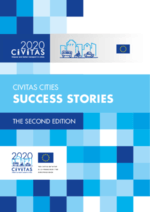
Funchal (Portugal)
Funchal is the capital of Madeira, an archipelago in the Atlantic Ocean. The town is 75 km² in size and has 104,000 inhabitants. The beautiful mountainous setting that attracts many tourists poses a particular challenge to the development of the public transport network and the promotion of alternative modes such as cycling. Funchal hosted CIVITAS Forum 2011.
Funchal is the commercial centre of Madeira, a Portuguese region with political and administrative autonomy, a local parliament and government. Discovered in 1417, only two of the four islands are inhabited with a total population of 245,000. Embraced by mountains, Funchal is situated in one of the most beautiful amphitheatres of earth and is known worldwide for achieving equilibrium between history and nature. The floating tourist population contributes to the already high population density of the city.
Funchal’s main road network consists of radial roads built along streams and transverse roads at altitudes between 0.4 and 200 metres. The network is complemented by very narrow and sinuous roads. Despite the challenges posed by nature, the public transport service offers a total of 66 routes and covers 180 km of road network. Overall, 144,000 trips are carried out daily within the city transporting a total of 30 million passengers a year.
Funchal progressively closed urban streets in the historic centre and constructed coastal promenades to promote pedestrian mobility and leisure activities. The city also restricted surface parking in the city centre and constructed street rings around the city, which helped to reduce the traffic flow in the centre significantly. Back in 2008, the Mobility Study of Funchal provided the framework and background for starting CIVITAS-MIMOSA by assessing the local mobility situation and trends.
As part of CIVITAS MIMOSA, Funchal demonstrated that improvements to the urban mobility system can be beneficial for tourism and overall quality of life. In Madeira, cycling is not common due to the hilly landscape. In the scope of MIMOSA, Funchal provided an intermodal line between bus and bike that allowed people to combine healthy exercise and ecological transport modes. A large-scale eco-driving campaign and cycling promotion led to considerable energy savings, and new green lanes contributed to increase public transport user satisfaction. The city alsoworked to reduce CO2 emissions by 10 percent through the introduction of cleaner vehicles, mostly hybrid cars.
In 2011, Funchal was visited by politicians, transport experts and other interested parties from the more than 180 CIVITAS member cities. The CIVITAS Forum 2011 provided a platform for the exchange of ideas, experiences and research. The annual event included workshops and plenary sessions, where participants could debate and discuss sustainable mobility policies and measures.
Funchal Municipality (CMF) Mobility/ MIMOSA microsite.
Projects
Mobility solutions
Resources
Multimedia Library
This is recommended related external content and can be viewed by clicking on it. By clicking you consent to the display of external content. This enables personal data to be transmitted to third-party platforms.
Read more about our privacy policy.
This is recommended related external content and can be viewed by clicking on it. By clicking you consent to the display of external content. This enables personal data to be transmitted to third-party platforms.
Read more about our privacy policy.


















